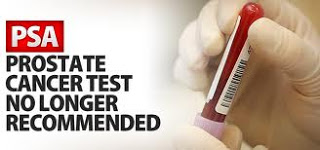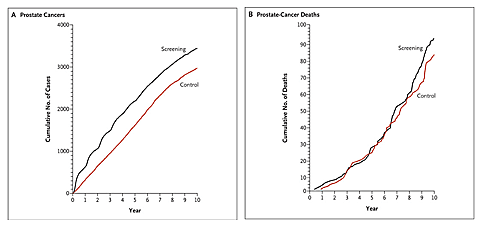Would you be surprised to know that one in 7 men will develop prostate cancer during his lifetime? Prostate cancer is the most common cancer among Canadian men and, on average, 73 Canadian men will be diagnosed with prostate cancer every day. Imagine that you are just diagnosed with prostate cancer. Your life will flash before your eyes, and try to handle the verdict in the midst of the flashbacks. But don’t be scared yet, gentlemen. And let’s look at how prostate cancer is commonly tested and see if it is necessary as part of normal checkups.
There are mainly two ways of testing for prostate cancer: PSA screening and digital rectal exam. PSA, also known as prostate specific antigen, is often used by doctors and healthcare practitioners to detect the presence of prostate tumor. Because PSA level in the blood generally goes up with the presence of prostate tumors, it is generally thought that early detection can be achieved by PSA screening.

PSA testing no longer recommended
Image: http://alvinblin.blogspot.ca/2012/05/uspstf-recommends-against-psa-for.html
However, U.S. Preventive Services Task Force (PSTF) concluded that PSA screening for prostate cancer are unreliable and do not offer men any tangible benefit in lifespan or quality of life. PSTF found that there are many more men who were injured by PSA tests than are helped by it. But, why?

First of all, PSA blood levels can be increased by many other factors, meaning that the test has a high chance of producing false-positives. Prostatitis, benign prostatic hyperplasia, and even rigorous physical activity can contribute to the increase in PSA blood levels. According to the ten years’ worth of comprehensive data on PSA screening, PSTF determined that, while at least 100 will receive false positives, only one in 1,000 men will derive any potential benefit.

A: increased diagnose of prostate cancer
B: minimal reduction in deaths by prostate cancer
Image: http://www.nejm.org/doi/full/10.1056/NEJMoa0810696
Secondly, PSA screening has serious side effects, thus does more harm than good. According to the study, Mortality Results from a Randomized Prostate-Cancer Screening Trial: it was concluded that the rate of death from prostate cancer was very low and did not differ significantly between the two study groups with over 76000 men: one that had PSA screening for 6 years and the other that had usual care as the control. Why did the PSA screening test fail to reduce the death from prostate cancer? Despite the early detection of prostate cancer, PSA screening led to other medical complications such as infection, bleeding, clot formation, and urinary difficulties. Treatment-related complications, which are generally more serious, included infection, incontinence, impotence, and other disorders.
Most men develop prostate cancer if they live long enough. However, prostate cancers are very slow growing and usually do not kill the patient. Long before the prostate cancer becomes life-threatening, it is more likely that a man with prostate cancer generally dies of some other cause. It questions us whether PSA screening is really necessary for healthy men. It is still a very controversial topic, but I cautiously suggest avoiding PSA screening as part of normal checkups, and I recommend digital rectal examination which is sufficient to detect prostate cancer without any medical complication. PSA screening should be done on patients only when there is an enlarged prostate or other related symptoms.
Andy Byun


One response to “Prostate cancer screening harmful to men?”